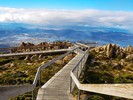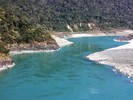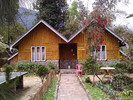The whale watching season in Sri Lanka runs from from November to April / May, as during the rest of the year, the waters will be too rough because of the Monsoon.
The best place to spot whales is in Mirissa, a small tourist town on Sri Lanka's south coast, popular for surfing and famous for whale watching. The waters around Mirissa are particularly rich in plancton (a groop of mirco organisms whales feed on), which lead scientists to believe there is a resident population always present which will result in sightings whenever conditions are good, particularly between November to April.
There are a huge choice of whale watching tour companies in Mirissa, and all of them charge more or less the same price. Choose the company carefully because not all of them care about the animals and some will even get you close to the whales, causing a lot of stress to the poor Cetacean. As with most tourist attractions in Sri Lanka, prices have been increasing a lot over the years. A whale watching safari costs approximately around 6,000 Sri Lanka rupees (around $42 / €30) per person. The tour itself involved a 1 hour early morning boat ride from 6:30am out into the Indian Ocean where the whales are known to be feeding. If you go during the whale watching season, your chances of seeing a whale are quite high (90-95%) and if not, most companies promise to re book your tour (for free).
Blue whales are the largest creatures on earth, measuring up to 30 metres in length, and luckily enough for you, they live only a few miles off the South Coast of Sri Lanka. The art to spotting the whales comes down to mastering their breathing behaviour. Whales are mammals so they have lungs instead of fish gills for breathing.
Therefore, they cannot breath underwater and need to come up for air. Blue whales can hold their breath underwater for an average 30 minutes before they have to surface for air. They don't have a nose and can't breath through their mouth so rely on their blow-holes. When they surface, they spout the air (and lots of water with it) out of their blow-hole.










